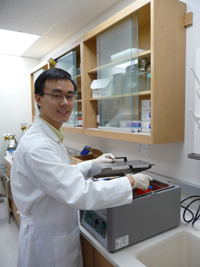 |
Kangmu Ma is the first participant in the joint M.D./Ph.D. program between UNMC and Shanghai Jiao Tong University School of Medicine. |
Since childhood, he’s wanted to be a scientist or a doctor.
Now, he’s working on accomplishing both.
The 24-year-old native of Shanghai wants to be the best of the best and he believes that to be the best physician, he also needs to the best researcher.
Ma, who goes by the nickname “Ben,” is the first Chinese student to enter the new UNMC-SJTUSM Physician Scientist Graduate Program (PSGP), a joint M.D./Ph.D. program with Shanghai Jiao Tong University School of Medicine.
“This program is a great chance for medical students to have a more complete education,” Ma said. “When I started my medical training in China, I found it was not enough for today’s professional to provide the best care. The training at UNMC will allow me to understand the disease more thoroughly and be able to translate treatments between the laboratory and clinic.”
When he heard about the program about a year ago, he visualized himself in Omaha, taking classes at UNMC. He immediately began to prepare and was one of the first to submit an application.
After a series of interviews, Ma was notified that he was selected for the program.
Under the program, students spend their first two years in medical school at SJTUSM, then come to UNMC for four years to earn their Ph.D., before returning to SJTUSM for two years to earn their medical degree.
Instrumental in developing UNMC’s relationships with China is Jialin Zheng, M.D., who earned his medical degree in China. He is a professor in the UNMC departments of pharmacology/experimental neuroscience and pathology/microbiology, associate dean of graduate studies-international affairs, and director of the Asia Pacific Rim Development Program.
“M.D./Ph.D.s can do clinical and research work. We have adapted UNMC’s well-built M.D./Ph.D. training model and the Biomedical Research Training Program mechanism to establish this new program with our collaborators at SJTUSM,” Dr. Zheng said. “It allows Chinese students who are in the eight-year medical program to put two perspectives together and better understand diseases.”
Initiation of the joint M.D./Ph.D. program, one of the first of its kind between the United States and China, was based on an agreement Tom Rosenquist, Ph.D., vice chancellor for research, signed last year with President Zhenggang Zhu of SJTUSM when Nebraska Gov. Dave Heineman’s delegation visited Shanghai.
In August, the program was officially inaugurated when UNMC Chancellor Harold M. Maurer, M.D., signed the final agreement with SJTUSM while in China.
Although Ma was all set to begin class in August, the U.S. Department of Homeland Security delayed his visa. When he finally arrived in Omaha, classes had already been in session for a month.
A PSGP committee was formed to carry out the tasks associated with this newly established joint UNMC-SJTUSM M.D./Ph.D. program.
|
“I’m impressed with Kangmu Ma. He received many awards throughout his education and he was a top student in his class in China,” Dr. Zheng said. “He’s also highly motivated and has been most patient with us while we work out the details this first year. Some parts have been rough, but Kangmu is flexible, cooperative, patient and understanding.”
Ma came highly recommended by his university, Dr. Zheng said. He and another student were accepted in the UNMC program initially, but the second student could not come because of a family issue.
Ma’s first six-week rotation was in the laboratory of Xu Luo, Ph.D., assistant professor, Eppley Institute, studying the mechanism of apoptosis, or programmed cell death. He is now working in the laboratory of internationally renowned neuroimmunologist Howard Fox, M.D., Ph.D., professor, pharmacology/experimental neuroscience and pathology/microbiology, for his second rotation.
The China Scholarship Council program provides $1,050 a month for Ma’s stipend and UNMC supplements an additional $750 to total the equivalent of what other graduate students receive. As with other graduate students, UNMC also waives his tuition.
Ma joins nine other students from China who are financially supported by the China Scholarship Council (CSC) program this year. These students are working on their Ph.D. degrees through the Medical Sciences Interdepartmental Area, and the colleges of public health, medicine and pharmacy.
Over the past few years, UNMC has developed a strong relationship with the CSC under the leadership of Drs. Maurer and Rosenquist, Don Leuenberger, vice chancellor for business and finance, Rubens Pamies, M.D., vice chancellor of academic affairs, and others, Dr. Zheng said.
While in China this past October, UNMC’s delegation, led by Leuenberger, signed a formal agreement with the CSC to accept Ph.D. students from other top Chinese universities. In addition, an agreement for accepting Ph.D. students to all colleges at UNMC and postdoctoral fellows, who will be partially supported by the CSC, is part of the new agreement. Next year, UNMC plans to accept up to three M.D./Ph.D. students to PSGP and from five to 10 CSC-supported students.
“Education is very important for friendship,” Dr. Zheng said. “Friendships last forever — from generation to generation. It allows us to build a bridge between China and Omaha.”
Ma, who pulled his American name “Ben” out of a hat in English class when he was 8 years old, comes from a family steeped in medicine. His grandfather, an internist, and grandmother, a pediatrician, were famous physicians in Shanghai. Before retirement, both of them were chiefs of physicians at a Shanghai hospital, Ma said.
“They are proud, as am I, that I’ve followed my dream,” he said.